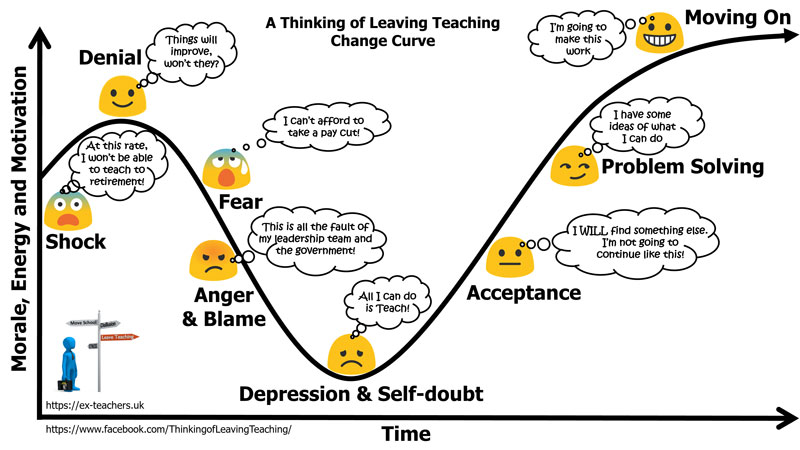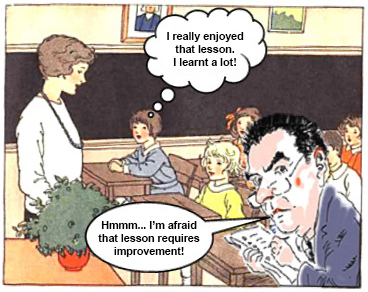I first began feeling stress in my job in 2006 which, was due to a change in my line management. It was then that I first started looking to leave teaching. I found an advert in the Birmingham Evening Mail about a coaching programme for people wanting to change careers. I visited the organisation and received a very pressured sales pitch (“Sign up today and you can have it for this price, but the price will double in 24 hours”). Because I was desperate to leave teaching, I parted with my money like a fool. I’m too embarrassed to say exactly how much I spent. Suffice to say, I could have spent the money on a couple of 14 night cruises.
I was told that, over the sessions, I would learn the secret to being successful in searching for the perfect job and changing my life. Half of the first session was taken up by the coach telling me about their career and how they had now found the perfect job! They had never been a teacher. They didn’t give me the completed folder of resources at the start; I was given a section during each session which we worked through with a clue as to what this “magic formula” was. To cut a long story short, the answer was Networking. The more I networked, the more I would find the relevant contacts in other jobs which would increase my chances of finding another job. What a complete waste of money that was!
It was several years later, at the end of the 2012 academic year, when I sat down and thought long and hard about my future in teaching. I had worked as a secondary school teacher in the UK education system for around 18 years; I was Head of ICT on UPS3 and so the pay wasn’t bad. But I was no longer enjoying the job. Things had changed for the worst since I trained in the mid-1990s and, for the first time, I started thinking of leaving teaching.
Exhausted
When I began teaching, I used to put a lot of my own time into preparing lessons and creating new resources. I didn’t keep track of the hours I was putting in back then, but it was easily over 55 hours per week. The key point, though, was that it was MY choice to put in many of those extra hours. By 2012, I was putting in over 60 hours per week. The difference was I didn’t choose to work those hours; I had to put in that time to complete all necessary work in addition to the increasing amount of pointless administrative tasks set by the ever-expanding number of assistant heads, each trying to validate their existence. The worst task was constantly updating the folder of lessons plans for every single lesson for the coming weeks. The enjoyment had gone; no longer could I choose to use my own time to create new resources.
Read my sections on:
Ageism
For a time, I considered promotion. I was looking for a Head of Department post and was thinking that I could go from there into management. That wasn’t as easy as I’d hoped. First of all, there weren’t many Head of Department positions advertised in the area I was looking at. Those I did find were, quite frankly, awful schools. One example from my own experience, in my early to mid-40s on UPS3, made me reconsider my future in teaching.
I was invited for an interview for a Head of Department post for ICT. There were three other candidates; a man and a woman who, like me, were over 40 and a 23-year-old who was in his 2nd year of teaching. The day consisted of a lesson observation and an interview with a pupil panel. I wasn’t interviewed by any adults. The pupil panel consisted of a boy and girl from Year 7 and 3 girls from Years 8 to 10. The 23-year-old David Beckham lookalike got the job. In the debrief was that the pupils said they thought I’d be strict and the non-ICT specialist who observed my 30-minute ICT lesson had fed back that there wasn’t enough differentiation. I got the idea for the lesson plan from ICT specialist, Matt Britland, who wrote for The Guardian! Other expensive teachers have complained to me that the same has happened to them on interviews. Ageism is rife in schools.
Read my section on It’s No Longer A Job For Life
Wishing My Life Away
In 2012, a nurse called Bronnie Ware published her book, The Top Five Regrets of the Dying: A Life Transformed by the Dearly Departing. One of the top five regrets is “I wish I hadn’t worked so hard’. You can read about the others on her blog, Regrets of the Dying. I was working too hard. I was 45 and exhausted. I knew there was no way that I could continue for another 22 years until retirement.
I was unhappy as a teacher but it wasn’t just the workload that was a problem. I was becoming more concerned with the effect that the stress was having on my body. I was also concerned that I was wishing my life away with countdowns to the next holiday as soon as one holiday had finished. How many teachers do you know who, a week after starting back in the autumn term, are already posting on Facebook about how much they’re looking forward to the next holidays, and ultimately the long summer holidays?
Live, so you do not have to look back and say: “God, how I have wasted my life”.
Elisabeth Kübler-Ross, M.D. (1926-2004)
Lesson Observations
What eventually gave me the push to look for an alternative to teaching was the feedback I started receiving in observations. Despite pupils telling me they enjoyed the lessons, certain members of senior management observing started being ultra-critical. For example, following an observation of an ICT lesson where I was introducing the topic of ‘Blogging’, using an idea from an ICT teacher who wrote for the Guardian newspaper, I was told by the English teacher observing that the pupils should have done the lesson on paper, not computers! I talk more about observations in Leadership, Management and Bullying.
When I left teaching, it was a huge step for me. It wasn’t an easy choice. Although I was very competent at searching the Internet for information, I didn’t have much success finding useful information to help me in my quest to find an alternative career. Whereas the Armed Forces have The Career Transition Partnership to help leavers find a new career or job by translating their skills, experience and qualifications into a successful civilian life, the Teaching profession doesn’t offer anything to help teachers find a new career.
Most of my Internet searches resulted in news articles about the increasing number of teachers who have left teaching and discussions about why teachers were leaving the profession. I found plenty of blogs and videos where people complained about several aspects of teaching in the UK; Michael Gove’s war on teachers, Ofsted, pointless bureaucracy and accountability, meaningless league tables, ridiculous lesson observation, etc. but there was very little else out there to help me. There were no tips or ideas for what else I could do and that was my reason for writing this.
Read my sections on:
The Stages of Leaving Teaching
When I decided to leave teaching, I wasn’t aware of the wide range of emotions that accompany career change. Luckily, I knew someone who specialised in ‘Change’ in business. They told me that, once I decided to leave teaching, I would most probably experience a range of feelings not too dissimilar from those depicted in the Kübler-Ross Change Curve, a model introduced by Elisabeth Kübler-Ross in a book called ‘Death and Dying‘ published in 1969.
In retrospect, I now know that the first of my emotions was shock. It was the realisation that if I was exhausted at 45, then how on earth would I be able to continue as a teacher for another 22 years? For the first time in my teaching career, it dawned on me that I probably wouldn’t be able to teach until retirement and that I would need to find something else. After the initial shock, I experienced much anger and blame, most of this directed towards the then Education Secretary, Michael Gove and his ‘war on teachers’, and Ofsted.
I was advised to seek some coaching at this stage. This would “enable accelerated acceptance and accelerated change, and therefore a shallower depression” to avoid spending too much time in a pit of despair thinking, “All I can do is teach!”

For many of those who contemplate leaving teaching, one of the common emotions associated with fear comes in the form of the question, “How will leaving teaching affect me financially? I can’t afford a pay cut!” This is the main barrier to leaving for many teachers.
Financial Implications
The financial implication of leaving teaching is one of the biggest hurdles for most people, and many will remain in a toxic work environment, in a job they hate and which is making them ill, because they insist, “I can’t afford to take a pay cut!”
As I have already mentioned, I was on UPS3 and so an important concern of mine was the financial implications of leaving teaching. What I did was write down my outgoings and decide what was essential. I created an “Income v Expenditure” budget spreadsheet. I entered my mortgage, bills and all other outgoings on a spreadsheet and this told me how much I needed to earn to cover them. You could do the same with this Income & Expenditure spreadsheet to help you:

The analysis of my spending habits showed just how much money I wasted. I was a classic victim of Parkinson’s Law:
“No matter how much money people earn, they tend to spend the entire amount and a little bit more besides. No matter how much they make, there never seems to be enough.”
How Parkinson’s Law relates to money
There were many things that I spent money on that were non-essential. An example of a non-essential would be the £3 morning coffee that some people buy every morning before work. That’s £15 per week, £60 per month, and over £650 per year… just on a morning coffee!
There were areas that I was able to make cuts. For example, my gym subscription, that I rarely made use of, was £50 per month which was £600 per year. I decided to get rid of that as I wasn’t making full use of it. I decided there were cheaper ways to keep fit.
I also made changes in my shopping habits; instead of shopping exclusively at Sainsburys, I would shop at Aldi. I discovered that there are some products sold by Aldi that are exactly the same product as sold by Sainsburys. The differences were in the branding and the price; exactly the same product, in the same shaped jar but with a different label, was sometimes half the price in Aldi compared with Sainsburys!
Taking my pension early has made a huge difference to my quality of life and I talk about pension stuff, such as Additional Voluntary Contributions (AVCs) in Pension Stuff – What I Did At 55. I also talk about why I decided to take my Teacher Pension at just before my 58th birthday.
Regarding pensions, I would strongly advise any UK teachers reading this to join the incredibly helpful Facebook group, run by David Fountain, called Teacher Pensions – Teacher to Teacher (UK).

What Else Could I Do?
The hardest part of leaving teaching is trying to find out what else you can do. I remember when I was younger and not knowing how to spell a word. “Look it up in the dictionary”, people would say, and I would proceed to search for words beginning with ‘S’ to find out how to spell psychiatrist! My initial search for jobs outside of teaching was just as frustrating as I had no idea what job titles to search for when I was job hunting. Many jobs I found didn’t specify that a teaching qualification was needed.
It’s all very well having a list of transferable skills, but what I found tricky was finding the jobs that would employ me with those skills. I learnt a phrase which perfectly described my situation, “You don’t know what you don’t know.” Also, many of the jobs didn’t exist when I first became a teacher. There were no “Instructional Designers” back then, for example. In August 2019, I landed a job as an “Learning Technologist”. I would never have known to search for that job title when I was thinking of leaving teaching back in 2013.
Since leaving teaching in 2013…
Since I left teaching in 2013, I have had several jobs. I’ve done some supply teaching like many people do when they first leave full-time teaching. There were some nice schools; there were some awful schools. The best thing was that if they were awful I could choose not to go back. The worst thing was that I couldn’t guarantee that I’d have work. Some days, especially towards the beginning of the school year and the end of the summer term, I didn’t get a call.
The first job I had after leaving teaching gave me an annual salary of £25,000. That was a huge cut compared with my Head of Department salary on UPS3 but my understanding of the value of money improved and I was able to pay my mortgage and bills and start living again! I earn more now, but still nowhere near as much as my UPS3 salary and yet I manage to save more money now than I did back then and I even make over-payments on my mortgage. I can do this because I have learnt the difference between what I need and what I want. Despite initial concerns about money, I am so much happier now and have no regrets about leaving teaching.
As an ex-Head of ICT Department, I had very good IT skills and became self-employed using my transferable skills creating videos for businesses. At the same time, I gained an assessor’s Level 3 Certificate in Assessing Vocational Achievement (CAVA) qualification and a Digital Marketing qualification and, in 2015, began working as a freelance assessor for apprenticeships in Creative & Digital Media and Digital Marketing. I worked as a tutor/trainer/assessor for Digital Marketer apprenticeships until summer 2019.
From 2017, I started applying for University jobs on jobs.ac.uk. I was successful in getting shortlisted for several interviews, but wasn’t successful in getting the jobs. This was partly due to lack of experience. For example, when applying for jobs as a Learning Designer/eLearning Technologist I was told in one interview that they wanted someone who could “hit the ground running” but I didn’t have enough experience of the systems they used. I developed myself in this area by improving my skills and creating a portfolio of work to demonstrate this. However, not getting the job was also down to my poor interview technique. I developed myself in this area by predicting questions and have a section in this website on interview questions.
In the tutor/trainer/assessor role, I was still involved in education but my learners could be any age, from 16 upwards. My oldest learner was the same age as me (51 at the time). A typical day? There was no typical day. The role included coaching and supporting learners, through Maths and English and their vocational elements of the Apprenticeship. This could be done face-to-face at the learner’s workplace or remotely by email, phone and Skype. It involved monitoring work on an online eportfolio and maintaining records, just like in teaching.
Trainer/Assessors are required to develop training resources and materials that meet the requirements of the Apprenticeship Standard. They build individual learning plans and assess all work produced, in order to support apprentices to End Point Assessment
Cons as an Tutor/Assessor
- I didn’t earn as much as when I was Head of Department.
- I had to motivate myself; it was easy to want a lie in when my office was the next room and on more than one occasion I thought to myself on a coffee break in my kitchen, “Oh, it’s sunny, I could cut the grass!”
- I was responsible for organising my days. There was no timetable like there was in teaching so I had to arrange my visits to see apprentices in their workplace.
- Some of my learners were based quite far away and involved a 3 hour drive to get to them.
Pros as a Tutor/Assessor
- I gained approximately 15 hours per week which I used to spend driving down the M6 to park in Birmingham City Centre and then walking in along the canals to my previous office in my job as an IT Trainer.
- I had more time to myself in the evenings and at weekends compared with previous jobs and most certainly more time compared with when I was a teacher!
- When I visited apprentices, I could claim back mileage.
- I was responsible for my workload.
- I had reasonable job satisfaction.
Jobs in Further Education
In May 2017, apprenticeships in the UK changed. With the new Apprenticeship Standards, there is more of a training element and so in addition to the assessor’s qualification, such as the CAVA, many training providers require their trainers to have a teaching qualification. This is good news for any teachers who may want to go down that route and become a trainer for apprenticeships.
If you’re a teacher who is thinking of leaving teaching and doesn’t know what to do then why not consider working in apprenticeships? You can find out more at the Institute for Apprenticeships website or do a search for “Training Providers” in your area. You will also find apprenticeships in colleges of further education.
If you are considering going into Further Education then look at information on the Education & Training Foundation site about becoming a further education teacher. As a qualified school teacher you are already fully qualified to work in the Further Education and Training sector and so there is nothing to stop you applying for jobs as you find them.
You can find jobs adverts on FE Jobs. Although the job adverts may refer to other teaching qualifications (eg DET), your PGCE/QTS is fully recognised in the sector. Many teachers come into Further Education and Training from schools wishing to teach literacy, numeracy, ESOL and/or Special Educational Needs (SEN).
Update July 2019
In June, I found an advert for a job in the area that I had been wanting to get into (Learning Designer/eLearning Technologist) on jobs.ac.uk. I applied for the job, completing the application form using the STAR technique that I mention on this website at Job Search – Completing Application Forms. I also included a portfolio of my work as a PDF attachment on the online application form.
I was successful in getting an interview and took a day off to brush up on interview technique, using the links that I have on this website at Job Search – Interview Questions. I am very happy to report that I was offered the job and am now a Learning Technologist at a University in the Midlands.
The salary is slightly more than I earned as an assessor, and that will increase as I am on an incremental pay scale. The pension is much better (the University contributes 10% in addition to my 6%) and there is more opportunity for promotion, should I want it, compared with my job as an assessor. The job also offers a generous annual leave entitlement of 29 days together with 11 bank holidays and discretionary days.
Has it been easy since I left teaching? No. Do I regret that I left teaching? No way! I’ve had fun since I left and I have gained skills and experiences which, in addition to teaching, made me the perfect candidate for the job I am in now, a career that I have been trying to get into for a couple of years.
If you’re an unhappy teacher then something will have to change. As someone told me before I handed my notice in, “If you always do what you’ve always done, you will always get what you’ve always got.”
Jobs in Higher Education
If you are considering going into Higher Education, then the best place to look for jobs is jobs.ac.uk. Most of my offers for interview have been through this site and my current job as a Learning Technologist was through this site.
Thinking of Leaving Teaching? Facebook Page
I set up the Facebook page, “Thinking of Leaving Teaching?“, in 2017 to help people who were thinking of leaving teaching but had no idea what to do next. The idea was that sharing experiences of how I and others left teaching would help unhappy teachers start to think about what else they could do. There are several examples of posts I shared from people who left teaching and described feeling a lot happier, less stressed and healthier. They also reported having more time for their own families. I decided to create this website as a resource to complement my Facebook page.






